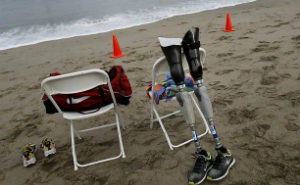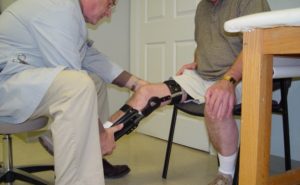For someone who has lost a limb, life can drastically change. Once taken for granted, simple daily tasks can suddenly become difficult or even impossible. Walking or even picking up objects can become major challenges. Custom-made prosthetics are offering new hope and freedom to those with limb differences.
But the impact extends beyond physical limitations. Losing a limb can also take an emotional toll, affecting one’s self-esteem and quality of life.
Fortunately, prosthetic technology continues to see breakthroughs. It provides a range of functionalities that can help people regain their independence and improve their quality of life.
As the best prosthetic company in Arkansas, Horton’s consistently produces custom-made prosthetics tailored to each patient’s preferences and goals.
This article will enhance your understanding of prosthetics by explaining how they function and what materials they usually consist of. Also, we will explain the significance of a skilled prosthetist in the prosthetic device creation process.
Read on to learn more about optimally designed prosthetics and what makes Horton’s the best choice.

What Are Prosthetics?
Prosthetics are artificial limbs designed to replace a missing limb or supplement a limb that is not functioning correctly. Prosthetic devices can fit any part of the body and range from simple devices, such as a hand or foot, to complex devices, such as an entire leg or arm.
The Importance of Finding the Right Prosthetic Fit
The primary focus should be ensuring you’re using the right prosthetic fit. Why? Take a look at what you can do with a well-fitted prosthesis:
- Choosing a prosthetic device with the proper fit will make you comfortable. It will not cause any pain, discomfort, or irritation.
- A custom-made prosthesis provides better functionality, allowing individuals to perform daily tasks with greater ease and independence.
- Finally, a perfectly customized prosthesis can improve your self-esteem, resulting in more confidence and control of your life.

How Do Prosthetics Work?
Several types of prostheses are currently available, each designed to provide a specific level of functionality and comfort.
The Most Common Types of Prostheses
Upper limb prostheses are designed to replace a missing hand, arm, or part of the arm. To be more specific:
- Transradial: This type of prosthesis acts as a replacement for your missing arm below the elbow to the hand.
- Transhumeral: This type of prosthesis mimics the functions of your arm below the shoulder to the elbow.
Prosthetic devices for lower limbs are engineered to substitute a missing foot, leg, or part of the leg. To have a better understanding:
- Transtibial: People with missing body parts from below the knee can look into the transtibial prosthesis.
- Transfemoral: This prosthesis mimics the functions of the missing limb above the knee.
How Can Prosthetics Be Controlled?
These artificial devices can be controlled using a body-powered system involving cables and harnesses. Or you can choose a myoelectric system, which utilizes electrical signals from the muscles to control the device.
Regardless of the type of prosthesis used, proper fit is essential. A prosthesis with an optimal fit increases performance efficiency and makes it easier for people to carry out regular daily activities. It also reduces the risk of injury and discomfort, allowing you to wear your prosthesis for extended periods without experiencing any adverse effects.
What Are Prosthetics Made Of?
Prosthetic devices are made from various materials, including plastics, metals, and composites. Each material offers unique benefits and drawbacks, and the choice of material depends on several factors, including the individual’s needs and the type of prosthetic device required.
Plastics
Prosthetic manufacturers commonly utilize plastics for their lightweight and durable characteristics. They frequently choose polypropylene for the test socket of the prosthetic due to its comfort and ability to be easily molded to fit the individual's residual limb. Moreover, they often opt for thermoplastic elastomers in prosthetic liners since they are flexible and help to minimize friction between the skin and the prosthesis.
Metals
Due to their strength and durability, metals such as titanium and aluminum are also used in prosthetic devices. These materials are commonly used in the structural components of the prosthesis, such as the frame, pylon, and knee joints.
Composites
Prosthetic device manufacturers also employ composites such as carbon fiber and fiberglass for their lightweight and strong properties. They typically utilize carbon fiber in the production of prosthetic feet because of its exceptional strength-to-weight ratio.
Manufacturing Processes for Custom-Made Prosthetics
Various manufacturing processes are utilized in the production of prosthetics, including 3D printing, machining, and manual fabrication. One of the key benefits of 3D printing is its ability to effortlessly create intricate shapes and structures. Similarly, machining is another frequently employed manufacturing process that uses computer-controlled tools to shape and cut prosthetic components. On the other hand, manual fabrication is a more conventional method that involves shaping and molding materials by hand.
What Is a Prosthetist?
A prosthetist is a healthcare professional who designs, fabricates, and fits prosthetic devices. You and your prosthetist must work closely to create custom-fit prosthetics tailored to your needs and preferences.
The role of prosthetists in the prosthetic device creation process is crucial. They begin by assessing the individual’s residual limb and understanding their goals and expectations for the prosthetic.
They then work to design and fabricate the prosthetic device, considering factors such as the individual’s weight, height, and activity level. Once the device is manufactured, the prosthetist ensures a proper fit and function, making adjustments as necessary.
Importance of Working with a Skilled and Experienced Prosthetist
Finding a skilled and experienced prosthetist is essential for achieving the most significant possible result with a prosthetic device. The best prosthetic lab for you will depend on several factors, but here’s a broad overview of what you should consider:
A prosthetist with experience and expertise can help you determine the best materials, design, and manufacturing process for your preferences.
A skilled prosthetist can also help individuals adjust to their prosthetic device, offering advice on care and maintenance and providing ongoing support and guidance. Finding a prosthetist who is compassionate, patient, and knowledgeable can make all the difference in the success of a prosthetic device.
The Horton’s Difference: Custom-Made Prosthetics
Horton’s Orthotics and Prosthetics is an excellent choice for those needing prosthetic or orthotic services in Arkansas. We offer various prosthetic services, including on-site fabrication capabilities that provide patients with custom-made prosthetics created in-house.
Patients won’t have to experience extensive delays because our custom-fit prosthetics are manufactured on-site. Quality control will not be an issue; our on-site fabrication capabilities allow us to monitor if the prosthetic devices are always at par with our highest standards.
Going Above and Beyond through Exceptional Patient Care
At Horton’s, patient care is of the utmost importance. We take a personalized approach to each patient, working with them to create a custom-made prosthetic that fits well and meets their individual needs and lifestyle.
The team at Horton’s is qualified, highly trained, and experienced. One of our primary goals is consistency in supporting and adopting the latest prosthetic innovations. We are dedicated to providing our patients with the best possible care.
Horton's is dedicated to enhancing the lives of amputees, whether they are constantly on the move as athletes or just parents who desire to play with their children anytime. We work hard to help people regain their independence and enhance their overall well-being.
Move Forward with Confidence in Custom-Made Prosthetics
It’s no secret that custom-made prosthetics can make a significant difference in the lives of individuals who have lost a limb or have a limb difference. Prosthetic devices can improve mobility, independence, and overall quality of life. However, finding the right prosthetic fit is essential for achieving these benefits.
We have discussed the different types of prosthetics, the materials and manufacturing processes used, and the importance of finding a skilled and experienced prosthetist. Also, we have highlighted how a prosthetist plays a crucial role in creating custom-fit prosthetics and the importance of finding a reputable provider.
Don’t let limb loss hold you back—trust Horton’s to provide the exceptional care and prosthetic fit you need to live life to the fullest. Contact us now to get started!



